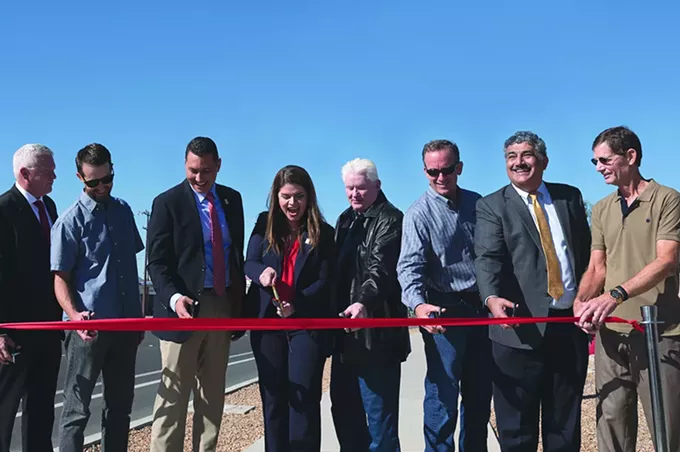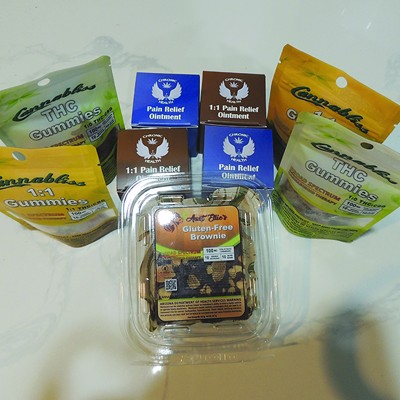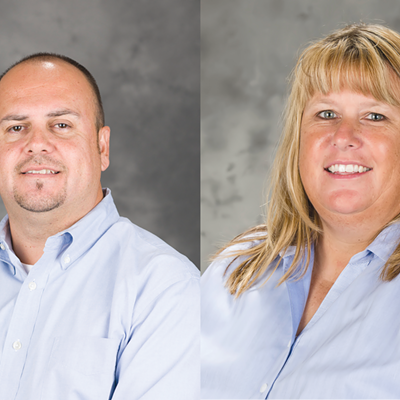
Hairmosa Salon owner
Christine Abeyta is excited about the completion of the Broadway Improvement Project. Her small business, which opened amid the pandemic, received support from the city of Tucson to stay afloat during the road expansion.
“We actually saw a lot of people from the neighborhood take advantage of our new business which was nice and I think it was convenient for them to support us in their own backyard,” Abeyta said.
The 2-mile improvement project that extends from Country Club Road to Euclid Avenue features six new travel lanes, landscaped medians, 6-foot-wide bike lanes, sidewalks, bus pullouts and a new underground storm drain system. On Thursday, Oct. 27, the city of Tucson unveiled the new “Sunshine Mile.”
“It helps traffic flow, people get anxious when driving in unfamiliar places or when you add construction,” Abeyta said. “I think we’re home free.”
“With COVID-19 kicking in during the same time this project (was) being done, it really took some dedication and grit for those companies to hang on,” said Gen. Ted Maxwell, Arizona Department of Transportation’s Regional Transportation Authority (RTA) representative.
“There are going be a lot of other businesses that are going to look to relocate to this area and make it a thriving economic corridor.”
Dubbed a “multimodal boulevard” by Mayor Regina Romero, the improvement project was years in the making, including collaborative efforts between the city and Rio Nuevo to preserve seven historic bungalows.
“All seven of those bungalows will be converted to food, beverage cafes and retail, including a culinary institute and visiting kitchen,” said Fletcher McCusker, chairman of the Rio Nuevo Board of Directors.
In 2006, voters approved an eight-lane, 150-foot-wide transit corridor that would have eliminated about 150 historic buildings on the north side of the roadway.
“In 2014, the Tucson mayor and council voted to cap this project at six lanes,” Romero said. “We also incorporated feedback from the community and that for me as a mayor and at that time as a council member was very important.”
Ward 6 Councilmember Steve Kozachik added, “In partnership with the county and the RTA, we were able to preserve about 130 of the businesses, small businesses, historic businesses and mid-century modern structures that are going to really frame the character of the Sunshine Mile going forward.”
The mayor touted the responsible use of public resources, looking forward to the next two decades of regional transportation planning.
Last year, the mayor and city council adopted the Sunshine Mile Overlay District, the next phase of investment that will provide more opportunities for future development, historic preservation and further opportunities for creating an “activated space for the community,” according to Rio Nuevo.
“The kinds of uses that are appropriate for being immediately adjacent to residential neighborhoods, because this is a roadway and people are living behind it,” Kozachik said.
“I have always said one of the most important investments governments can make is in public infrastructure, because public infrastructure leverages private investment and (the) Sunshine Mile has all of the right pieces to be a corridor that demonstrates what we can do along many of our major corridors in the city of Tucson,” Romero said.
“I hope that the experiences we’ve had in this project serve as a template for how we move other transit corridors,” Kozachik said.
Maxwell said “economic investment is sometimes a bad word,” but he added he thinks it’s time to acknowledge that it is valuable to the community.
“New roadways, new corridors, when they’re built attract investment,” Maxwell said.
Tucson’s first Ethiopian restaurant Zemam’s, which opened in 1993 in a small house on Broadway, is also preparing to expand its footprint in the Sunshine Mile Overlay district, by creating an international ethnic and cultural center in the Bungalow Block.
“Working with the city and the RTA, Rio Nuevo has acquired the three properties west of (Zemam’s) and we’re going to help them convert that into an African bazaar, Ethiopian coffee shop, international bar and parking lot,” McCusker said.
“(Our) parents opened (Zemam’s) on a credit card with nothing else,” said Lucas Gebremariam, manager of Zemam’s.
“We want this to be a destination for Tucson but we also want it to be an opportunity for local people in Tucson, who want to start a business but don’t have the capital to come and share their food, culture and tradition,” said Favin Gebremariam with Zemam’s.
“We want to be a place that’s inclusive and driven by community,” Lucas Gebremariam said.
The expansion, Z Street, will be an internationally themed space with a niche sports lounge, food vendor stalls and a communal kitchen.
“The goal when you come in is to be transported to a different place that’s not like anywhere else in town,” Lucas Gebremariam said.
Rio Nuevo also awarded two 16 property blocks to local companies, the Solot Plaza to the Larsen Baker commercial real estate company between Tucson Boulevard and Treat Avenue, and the Friedman Block between Tucson Boulevard and Plumer Avenue, to the Grant Krueger Team.
“In the next two years, you’ll see something in the neighborhood of 50 different stores, restaurants, cafes, shopping opportunities along the Sunshine Mile,” McCusker said. “The artery to the heart of Tucson Downtown.”
“We are grateful for every choice that led to the preservation and redemption of historic and significant spaces,” said Andy Littleton, president of the Sunshine Mile Business Association. “For every choice that moved this area to be more artful, accessible and keeping with its history than it could have been.”












